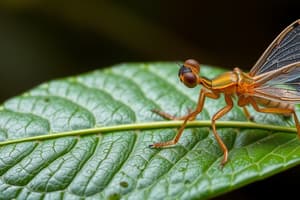Podcast
Questions and Answers
What are the three domains in which living organisms are classified?
What are the three domains in which living organisms are classified?
Bacteria, Archaea, Eucarya
What is the term that refers to the study of the origin and development of words?
What is the term that refers to the study of the origin and development of words?
Etymology
What is the fundamental unit of life in living things?
What is the fundamental unit of life in living things?
Cell
How do living organisms obtain energy for their metabolic activities?
How do living organisms obtain energy for their metabolic activities?
What does the term 'lifende' mean in Old English?
What does the term 'lifende' mean in Old English?
What is the term 'þing' in Old English related to?
What is the term 'þing' in Old English related to?
What is the basic unit of life?
What is the basic unit of life?
Define energy processing in living organisms.
Define energy processing in living organisms.
Explain the concept of natural selection.
Explain the concept of natural selection.
What are the two modes of reproduction in living organisms?
What are the two modes of reproduction in living organisms?
Describe the hierarchical organization of living things.
Describe the hierarchical organization of living things.
Why is understanding biology essential?
Why is understanding biology essential?
Flashcards are hidden until you start studying
Study Notes
Living Things: An Overview of Biology
Living things, also known as organisms, are entities that show the characteristics of life. They are organized structures that require energy, respond to stimuli, and are capable of reproduction. Biology, the scientific study of life, is concerned with understanding the processes and interactions that underlie the behavior and functioning of living things.
Living organisms are classified into three domains: Bacteria (true bacteria), Archaea (archaebacteria), and Eucarya (eukaryotes). The term "Etymology" refers to the study of the origin and development of words. The word "living" comes from the Old English "lifende," which means "living" or "having life." The term "thing" comes from the Old English "þing," which means "entity," "being," "body," or "matter".
Characteristics of Living Things:
Living things exhibit a range of characteristics that define them as living:
-
Organized Structure: Living things have a systematic, coherent design, whether they are single-celled or multicellular. The cell is the fundamental unit of life, and it is organized with distinct structures and functions.
-
Energy-Requiring: Living organisms require energy to carry out various metabolic activities. This energy can be obtained through photosynthesis, which converts light energy into chemical energy, or cellular respiration, which extracts energy from organic substances.
-
Reproductive Capacity: Living things are capable of reproducing, either sexually (through the union of male and female sex cells) or asexually (without the involvement of sex cells).
Levels of Organization:
Living things are organized hierarchically, with cells as the basic unit of life. Cells are organized into tissues, which are further organized into organs and organ systems. These structures work together to carry out the functions necessary for the survival of the organism.
Energy Processing:
All living things require energy to survive. Energy is the ability to perform work, and it is stored in the form of Adenosine Triphosphate (ATP) in cells.
Adaptation and Evolution:
Living organisms are adapted to their environment, and they can adapt to changes in their environment through natural selection. This process of adaptation over time leads to the evolution of species, resulting in the diverse range of organisms found on Earth today.
In conclusion, living things are complex entities that exhibit a range of characteristics that define them as living. Biology is the science that studies these organisms and the processes that underlie their functioning. Understanding biology is essential for understanding the world around us and the life that inhabits it.
Studying That Suits You
Use AI to generate personalized quizzes and flashcards to suit your learning preferences.




